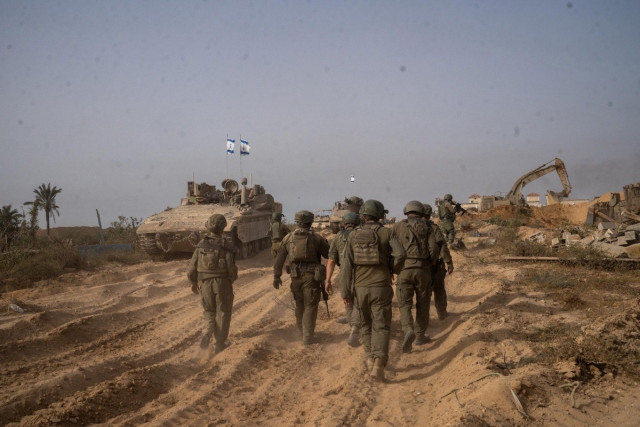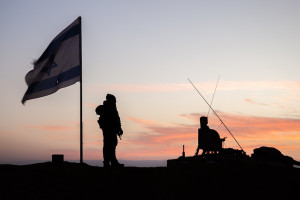A look into the invisible battle of Israel's women left behind as their husbands head to war
ALL ISRAEL NEWS correspondent Oriel Moran speaks with 3 generations of IDF reservists wives

Since the start of the Oct. 7, 2023, Gaza War, as many as 295,000 Israeli reserve soldiers have been serving in Gaza and Lebanon for weeks and months on end. But what about the women who are left behind?
ALL ISRAEL NEWS Correspondent Oriel Moran interviewed three generations of women in the Golders family who have had to watch their loved ones go fight in the many wars and operations of Israel, not knowing if they will return.
Adina, originally from Argentina, lived through the Six Day War and went on to raise four sons, all of whom served in different combat roles during the First Intifada and the First Lebanon War. They are now reservists. Her daughter-in-law, Nili, raised two sons of her own, both of whom are currently serving as combat soldiers. The newest addition to their family is Adi, who recently married one of Nili’s sons.
Nili shared, “As a kid, when my father went to the Yom Kippur war, my mother took care of us alone and we didn't realize it then, but I realized how hard it is now, I think of her – how she managed four kids. I was a cry baby. I cried all the time because I missed my father. I was very miserable. I was a horrible student, I couldn't study… I was seven and also my cousin got killed in the war.”
Nili said she didn't think about the risks of marrying a combat soldier. “But from the moment that the kids were born, that's another story,” she said. “I knew that there will come the day that they will go to the army. And I had no doubt that probably they will be in combat.”
Moran observed that Nili’s heart was divided. Her sons were both a source of pride and simultaneously a constant source of worry, the kind only a mother can understand.
Looking at her son’s empty room, she said, “he did leave this picture of his friends,” showing a photo of her son “S” with his unit. "You know, they’re like brothers… brothers that love each other, they trust each other, fight together, train together. We know them, all of them. We know the families and so we also attach to each one of them and when we worry about our son, we not only worry about him, but we worry about them as well.”
Moran asked Nili the following questions: "How do the wives of reservists juggle caring for the home and children while maintaining their jobs? How do they handle the fear of becoming widows, losing sons and daughters, and how do they support each other? How do you talk to your children about war?"
“I didn't want my kids to feel that something bad was happening, so we lived a normal life, did what little things kids like to do,” said Nili, looking back on their childhood. She continued, “It is difficult. They can escalate, asking, 'Where is daddy?' So you have to say that he will come back and everything will be okay… One of my sons asked me, 'Will Daddy die?' And I told him, 'No, he's very strong. You have to trust him. He won't die.'"
“I was afraid that if something will happen to him, then I lied,” Nili admitted. “That's why I never told my kids that when they grow up, there will be no more need in the army.”
And she was right. As her sons grew up, the need to secure Israel remained, and both her sons became combat soldiers, “R” in infantry special forces and “S” as a combat medic in the paratroopers.
On the morning of Oct. 7, her son “S” was at work. Even before he received the official call to join the reserves, he sent the request to Nili to pack his army gear.
“What is going through your mind?" asked Moran. “Mostly in my heart. I feel that my heart is going down,” Nili replied. “You're in a strange situation. You did not wake up that morning thinking that you would have to say goodbye to both of your sons.
“When you're hugging goodbye, was [there] the thought this could be my last hug?” Moran asked.
“Yes,” came the frank reply.
Adi met Nili’s son “S” in high school. They dreamed of marriage and a future together and like many young couples after Oct. 7, they realized tomorrow wasn't promised. Some even got married in their uniforms and combat boots, on their bases with a simple chuppah above them, and no guarantee the newlywed wives wouldn't soon be widowed. Adi and "S" also felt there was no point in waiting and married even though he had to go and serve, only returning home occasionally.
When asked by Moran what advice she would give to Adi, Nili told her, “To believe, to be optimistic, to try to trust his friends. That's what I do. That's the way for me to cope. I trust their friends. I trust their brotherhood, their togetherness, their love for each other.”
After listening to Adina’s memories and experience, Adi remarked, “What really surprised me to hear from Adina is that she has been through so much, so many wars, and she has many years of life experience with wars and her sons… that this war has been the most difficult.”
The women agree that it’s a responsibility to fight for the country, if an unwanted one.
“We are regular people that want to live a peaceful life, that the last thing that we want in our life is wars. Nobody likes wars,” said Nili. “I didn't raise my kids to die. I raised them to live.”

Jo Elizabeth has a great interest in politics and cultural developments, studying Social Policy for her first degree and gaining a Masters in Jewish Philosophy from Haifa University, but she loves to write about the Bible and its primary subject, the God of Israel. As a writer, Jo spends her time between the UK and Jerusalem, Israel.
You might also like to read this:















